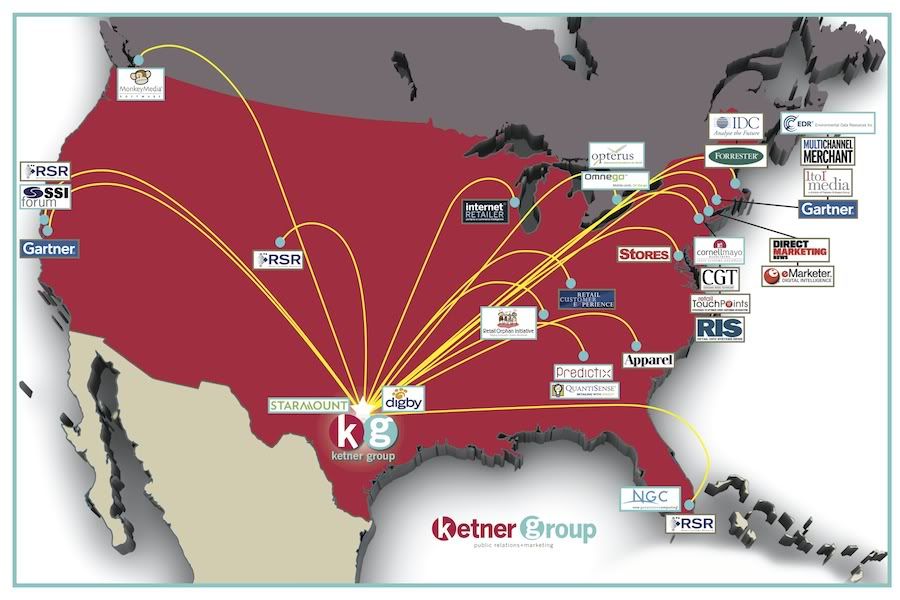William T. Dillard (1914-2002), founder of the Dillard’s department stores, is the person most often credited with the quotation, “Location, location, location.” Supposedly, one of the things that helped make him so successful was that he took notice of consumer’s shifting preference to indoor shopping malls. Of course, all you have to do is look at The Domain here in Austin for evidence that this preference seems to be shifting yet again.
We got to thinking a lot about location recently, wondering if it is equally important across all industries. With retail stores, restaurants, etc.—of course. Location is absolutely key. (Again—Austinites, if someone gave you $5 million 5 years ago to open a retail store, would Highland Mall be anywhere on your list of possibilities? Well I sure hope not, because it’s about to become the next ACC campus.) But in the age of globalization, Rebecca Black, and Cheezburgers, does location for certain types of business really matter anymore? If it’s not obvious yet, I’m talking about PR firms (though the same question could apply for interactive agencies, web developers, journalists, etc.)
Twenty years ago, unless you had a huge budget and could afford a lot of travel, companies searching for a PR firm looked in the city where their business was located. Without the web, that was the way to get things done. Ten years ago with the Web booming (well, after a little busting), a lot of companies thought, “If I want the best firm, I will look in New York or Silicon Valley. That’s where the influencers are that I care about, so that’s where the good media relationships will be.” Here’s where the first issue comes in: With the number of PR professionals in NYC and the number of vastly different types of media professionals there, 90% of the agencies with offices in New York are not going to have the connections that you want. This opens another can of worms altogether: Just because someone in PR has a relationship with a journalist or blogger does not equate to that journalist/blogger being any more interested in the client’s product that PR person wants them to cover—and to me, making that assumption is what damages the relationship and gives PR folks a bad rap.
At Ketner Group, we feel like the location point is largely moot for our specific business. We have clients all over the technology spectrum: high tech, retail tech, green tech, and more. A large part of our business is and has always been retail technology, so I’ll use this as an example. Because we’re known as the go-to agency for retail tech, our retail clients are spread out all over the country—and some in Canada. We do have clients in Austin, and we do love being able to meet with them face-to-face and getting the occasional break from conference calls and Outlook. Yet, some of our closest, most successful long-term client relationships have been with clients across the county in places like San Diego and Miami. The bulk of what we do can be done via the computer or phone—which is not surprising because I’m pretty sure between my iPhone, iPad and laptop, my gadgets can do everything but fry my eggs and iron my pants. Though I’m sure Steve Jobs is working on it.
When it comes to retail media and analysts, we have great relationships with dozens of these people all over the country (and sometimes farther) as well. One of our favorite retail analyst firms, Retail Systems Research (RSR), is spread out across Denver, Miami, Boston and the Bay Area – yet seeing their team in person, you’d never know it. And even though our office is 1,000 miles from their closest analyst, we have built such strong relationships with RSR both professionally and personally that the distance has never been a barrier. Even though a number of our media/analyst relationships are indeed clustered in the northeast, we believe that because of the nature of our business, being located in Austin is more or less irrelevant. This case is only strengthened when you bring in other elements such as:
- The increasing popularity of virtual offices like RSR’s for media/analyst businesses looking to keep overhead low
- Media reducing permanent staff and increasing work with freelancers all over the country, also for overhead purposes
- The future of media as largely online rather than in print
The map that you see here is one that we recently created to illustrate this exact concept. Most (but not all) of the clients on here are retail, and we only included a handful just to show the diversity of location. In the gray boxes are a sampling of retail-related media and analysts with whom we have worked successfully and seamlessly for years, despite the distance between us. To us, this map is a snapshot—not comprehensive, and certainly geared mostly toward the retail part of our business, but an important snapshot nonetheless—of the idea that location is just not all that significant for much of our business anymore.
Of course, there are always exceptions to this. Our client Booqoos, for example, is based in Austin and has focused the launch of its unique deals site heavily on the Austin area. Because of that, our presence here and work with local media and bloggers has been critical. Obviously my point does not apply for certain types of PR firms or clients – but it challenges the assumption that location applies to every type of agency and every type of client. In our experience, it does not, and that has allowed us to work with a wide variety of pretty great clients all over. For better or for worse, we live and do business in a globalized economy and society.
We started with one quotation, so let’s end with another – this one from British politician, Clare Short: “People have accused me of being in favor of globalization. This is equivalent to accusing me of being in favor of the sun rising in the morning.”

